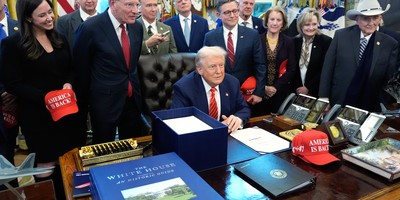There are events in history that no one alive will ever forget. But time moves on and those who will never forget eventually leave this earth. The rest of us know it only from the history books.
One of those events was the Japanese attack on Pearl Harbor. Only a handful of Americans alive today actually remember the day President Franklin Roosevelt said would forever live in infamy. Even fewer remember that the first Administration spokesperson to address the nation that day was not the president, but First Lady Eleanor Roosevelt.
In those days, radio was the hot communications technology, and just about all Americans listened to it. President Roosevelt famously bonded with the American people through a series of "Fireside Chat" broadcasts. But the First Lady also hosted a weekly show that aired every Sunday night.
Upon learning of the Sunday morning attack on Pearl Harbor, the decision was made for Mrs. Roosevelt to go ahead with her regular weekly broadcast. She did, however, change the introduction to say she was speaking "at a very serious moment in our history." Her commentary informed the nation that "The Cabinet is convening and the leaders in Congress are meeting with the President."
The First Lady went on to disclose the treacherous fact that "the Japanese ambassador was talking to the president at the very time that Japan's airships were bombing our citizens in Hawaii and the Philippines."
Mrs. Roosevelt made it clear that all Americans were involved in this struggle. Although it's impossible to imagine today, the political elites in the 1940s were not exempt from the obligations imposed on other Americans. Speaking as a mother, the First Lady shared her concerns. "I have a boy at sea on a destroyer, for all I know he may be on his way to the Pacific. Two of my children are in coast cities on the Pacific."
Recommended
But she maintained her poise. "We know what we have to face and we know that we are ready to face it." She expressed confidence that "Whatever is asked of us I am sure we can accomplish it. We are the free and unconquerable people of the United States of America."
And then she did something no political figure would do in the 21st century. Rather than encouraging everyone to obsess over the latest new and political responses, the First Lady said it was time to "go about our daily business." But to do so "more determined than ever to do the ordinary things as well as we can." She added that "when we find a way to do anything more in our communities to help others, to build morale, to give a feeling of security, we must do it." And then Eleanor Roosevelt practiced what she preached by going "back to the program we had arranged."
That last bit of advice makes as much sense today as it did 76 years ago. It's important to be aware of the news and political responses, but it's the daily business of life that is even more important. The way to move our nation forward is to "do the ordinary things as well as we can" and "do... more in our communities to help others."
Thank you, Eleanor Roosevelt.

























Join the conversation as a VIP Member